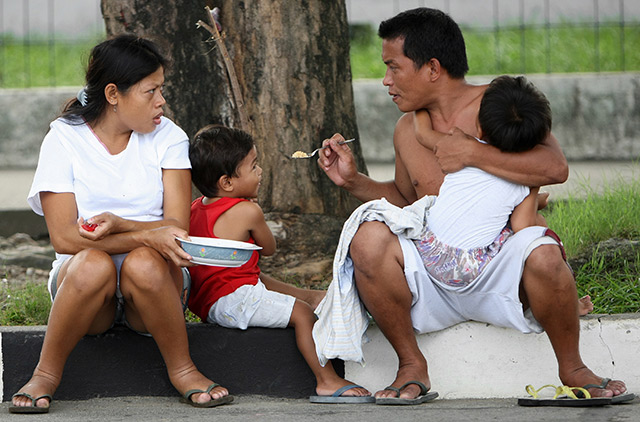
MANILA, Philippines – More than 3 million families are estimated to have suffered from involuntary hunger during the 3rd quarter of 2015, a recent Social Weather Stations (SWS) survey reported.
The survey results, first published on BusinessWorld on Monday, November 2, stated that 15.7% of total respondents have experienced involuntary hunger during the months of July until September.
The latest hunger rating is considered the highest mark for 2015 and is 3 points higher than the 2nd quarter’s 12.7% or 2.8 million families. (READ: Hunger lowest in 10 years – SWS)
Moderate hunger or not having something to eat “only once” or “a few times” in the last 3 months, affected an estimated 3.1 million families or 14.1% of respondents. It is 3.3 points higher than June survey’s 10.8% or 2.4 million families.
Meanwhile, severe hunger – going hungry “often” or “always – registered its lowest rate since September 2003 with only 1.6% or estimated 361,000 families within the same period.
Highest in Mindanao
The SWS survey found out that hunger was more prevalent in Mindanao with 21.7% or 1.1 million families from June survey’s 14.3%. With an increase of 7.4 points, the 3rd quarter of 2015 results in the region is the highest since 2013.
Meanwhile, in Metro Manila, the prevalence of hunger remained constant at 18.3% or 553,000 families.
In Balance Luzon (areas of Luzon excuding Metro Manila), hunger increased to 14.7% or 1.4 million families from June’s 10.7% or 1.1 million families.
Visayas, on the other hand, saw a decrease in hunger to 9.3% or 399,000 families – 2.4 points from June’s 11.7% or the lowest since 2004.
The survey was conducted in September 2-5 among 1,200 adults nationwide with sampling error margins of ±3 points for national and ±6 points for Metro Manila, Balance Luzon, Visayas, and Mindanao.
Hunger a problem to fix
In addition to the SWS survey, the 2015 Global Hunger Index of the International Food Policy Research Institute identified the hunger situation in the Philippines as “serious.” This has been the same in the past years. (READ: 2015 global index: PH hunger, malnutrition problem 'serious')
Beyond hunger, Filipinos – especially children – continue to suffer from malnutrition which can lead to irreversible diseases that may hinder mental and physical growth.
With the upcoming 2016 elections, several advocates hope that hunger and malnutrition will be among the main issues discussed by aspirants. The future leader of the Philippines should help make zero hunger a priority. (READ: #TheLeaderIWant: Commited to zero hunger and good governance) – Rappler.com